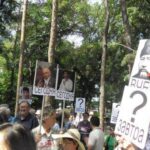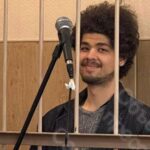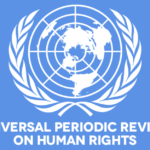An attempt by the Astana journalistic community to protect press freedoms, which can be sharply curtailed by the adoption of a new law on the mass media, has run into the virtual absence of freedom of peaceful assembly in the country.
The other day, an interdepartmental commission approved and sent to parliament a new draft law “On Mass Media” drafted by the Ministry of Information and Public Development.
This draft contains a number of norms that are extremely discouraging for journalists and the media, as well as for bloggers and users of social networks in general. The inadmissibility of including these norms in the draft law and the desirability of removing them from it were directly pointed out by members of the working group on drafting the bill, invited to it by the ministry as representatives of the journalistic community. However, their objections were ignored, and the draft was sent to parliament with all of its gems like obligatory licensing for journalists to work in the media and other things in the same vein.
In response, the Kazakhstani press defense organizations addressed an open letter to the head of state, urging him to prevent the emergence of a reactionary media law in the new Kazakhstan, which includes totalitarian norms that the old Kazakhstan did not have time to think of. And in Astana, press advocates submitted a notice to the akimat about their intention to hold a rally against the adoption of the reactionary bill and in defense of freedom of speech. The response to this notification from the capital akimat was a refusal to approve this rally.
The officials didn’t bother to be creative in their choice of motives for the refusal, and gave the applicants the old as the world and painfully familiar anti-mingling cliché, reproducing the standard sign on the door of a hotel or restaurant from many forgotten Soviet times: “No room”. If we believe the answer of the Astana Akimat, there is no room for a pre-meeting in any of the Astana squares or squares, not even on the ice of the frozen in winter time Ishim-Esil river in the capital.
“The department of internal policy of Astana city has agreed earlier received applications for carrying out peaceful assemblies on a specialized place during the period specified in the notice. In this connection I inform you that the satisfaction of this notification is not possible”, – said in the Akimat response.
At the same time, neither in the text of this response, nor on any of the information resources of the Akimats of Astana or city districts there is no information about holding any events on the declared day at any of the sites allocated for this purpose. This leads to the assumption that no “previously agreed statements on holding peaceful assemblies” have actually been received, which means that the refusal to hold a rally in defense of freedom of speech is based on a statement that does not correspond to reality. “Congratulations, citizen, liar!” – as Bulgakov’s character Koroviev said to the entertainer Georges Bengalsky.
However, even if we Zoya suspect Akimat officials of lying, and the alleged occupancy of one or two venues set aside in a city of millions for peaceful assemblies is a real fact, this does not change anything in principle. First of all, there are clearly not one or two squares in the capital city in which people could rally without disturbing other people rallying at the same time in another square. Second, and most importantly! – There is a deeply flawed legislative and enforcement situation in which the Law on Peaceful Assemblies adopted in 2020, which supposedly establishes a notification procedure for holding assemblies, is still permissive in essence, and the law enforcement practice on it is actually prohibitive.
In this regard, it is highly symbolic that while the Law on Peaceful Assemblies is supposedly notification-based, a peaceful assembly with an agenda to criticize the draft Law on Mass Media has been banned. The two most important civil liberties – freedom of speech and freedom of assembly by their very nature are in the same harness, but in our case they are also coupled.

















